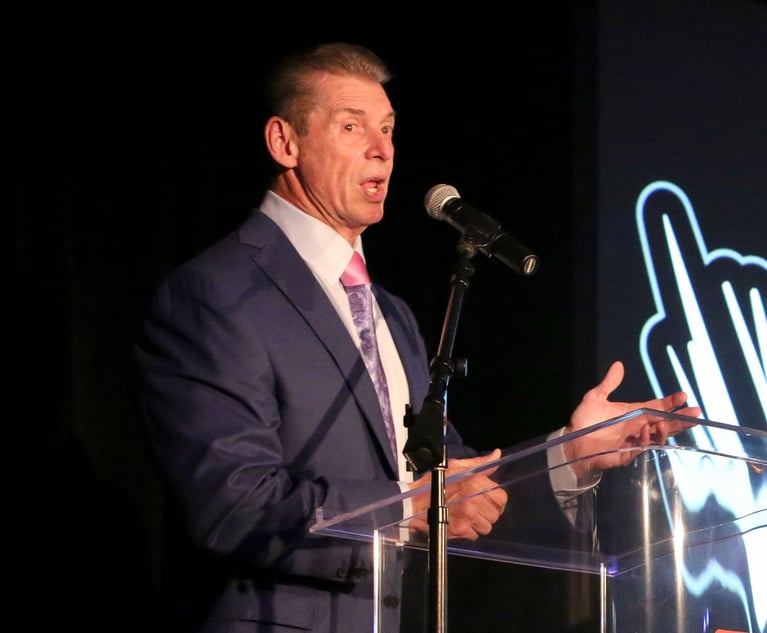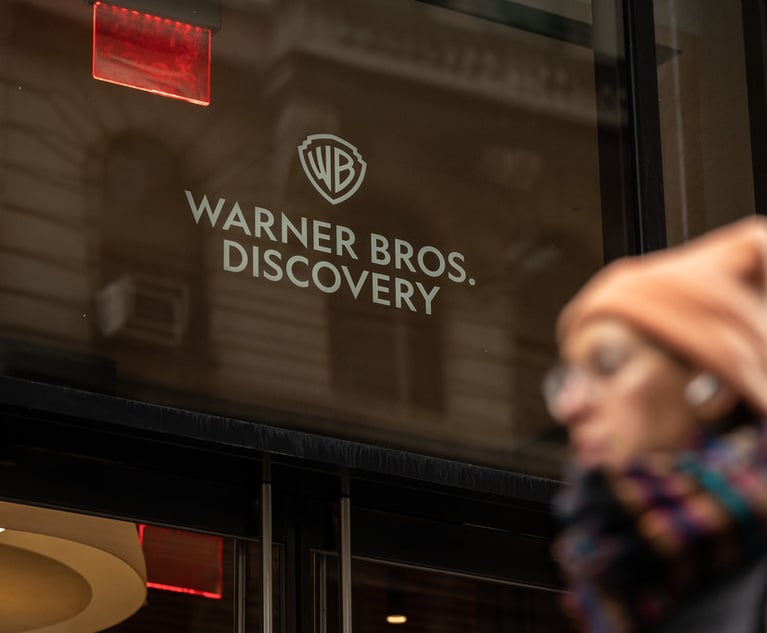 MAMACHA cafe, previously 'MoMaCha', at 312 Bowery, Manhattan. Photo: David Handschuh/NYLJ
MAMACHA cafe, previously 'MoMaCha', at 312 Bowery, Manhattan. Photo: David Handschuh/NYLJMoFo Helps MoMA Score Trademark Injunction
A nearby art gallery and cafe that called itself MoMaCha will have stop using the name, at least for now.
October 03, 2018 at 07:57 PM
3 minute read
MoFo has helped the Museum of Modern Art (MoMA) block a cafe from using the mark MoMaCha.
If that sounds confusing, well, that's part of the problem U.S. District Judge Louis Stanton of the Southern District of New York was trying to resolve last week by issuing a preliminary injunction.
New York's MoMA became concerned last spring when a company calling itself MoMaCha opened an art gallery and cafe on the Lower East Side within a few blocks of MoMA's design store.
MoMA accused MoMaCha of using a confusingly similar name and font. The museum also noted that MoMaCha serves beverages infused with cannabidiol, decorated with a foam marijuana leaf—something that is not on the menu at MoMA. Nevertheless, one social media user posted a photo of the drink and described it as “great excuse” to visit MoMA.
MoMA brought aboard a Morrison & Foerster team that included partners Jennifer Lee Taylor and Jamie Levitt, plus associates Sabrina Larson and Madeleine Gully.
MoMA argued that MoMaCha had simply taken its famous mark and appended “cha,” a word for tea. MoMaCha said the name actually is a play on More Matcha, a reference to green tea. MoMaCha also argued that it has displayed disclaimers on its doors and website saying it's not affiliated with the museum. It says the museum came to the court with unclean hands because it's a large entity trying to “bully” MoMaCha and cripple its business.
Stanton brushed the latter claim aside. “There is no showing that the museum has unclean hands or has pursued this litigation in bad faith,” he wrote in a 37-page order.
Rather, he wrote, “It is more likely than not that MoMaCha intentionally copied the museum's mark in bad faith when it adopted its old logo. As discussed above, the marks are strikingly similar and almost identical in terms of the font style, coloring, and capitalization.”
MoMA proved that its marks are descriptive and have acquired secondary meaning through publication in media ranging from The New York Times to Art in America. Although San Francisco calls its modern art museum SFMOMA, and North Miami's Museum of Contemporary Art goes by MoCA, those museums are in different cities, which reduces the likelihood of confusion, Stanton wrote.
MoMA “is strong and distinctive, and identifies its goods as coming from the museum,” Stanton wrote. “As a result, the use of a similar mark on a product from a different source is likely to confuse consumers into associating the product with the museum.”
Social media posts about MoMaCha that used the hashtags “#museum,” “#gallery,” “#newyorkart,” and “#modernart” could have added to that confusion, Stanton added.
All of this added up to an injunction blocking MoMaCha from using or displaying the MoMaCha mark, and shutting down its website momacha.com. (It now redirects to a skeleton site at momacha.nyc.)
MoMaCha was represented by Christopher Spuches of Agentis PLLC. He told artnet.com that, “We respect the court's decision, but respectfully disagree that MoMaCha and its products infringe on any of MoMA's intellectual property.”
This content has been archived. It is available through our partners, LexisNexis® and Bloomberg Law.
To view this content, please continue to their sites.
Not a Lexis Subscriber?
Subscribe Now
Not a Bloomberg Law Subscriber?
Subscribe Now
NOT FOR REPRINT
© 2024 ALM Global, LLC, All Rights Reserved. Request academic re-use from www.copyright.com. All other uses, submit a request to [email protected]. For more information visit Asset & Logo Licensing.
You Might Like
View All
SoundCloud GC Takes Legal Reins of Condé Nast at Tumultuous Time

With SDNY Stay Lifted, Sex Trafficking Civil Suit Against Vince McMahon, WWE Gets Green Light
3 minute read
Big Tech and Internet Companies Slammed With Consumer Class Actions in December

Trending Stories
- 1Call for Nominations: Elite Trial Lawyers 2025
- 2Senate Judiciary Dems Release Report on Supreme Court Ethics
- 3Senate Confirms Last 2 of Biden's California Judicial Nominees
- 4Morrison & Foerster Doles Out Year-End and Special Bonuses, Raises Base Compensation for Associates
- 5Tom Girardi to Surrender to Federal Authorities on Jan. 7
Who Got The Work
Michael G. Bongiorno, Andrew Scott Dulberg and Elizabeth E. Driscoll from Wilmer Cutler Pickering Hale and Dorr have stepped in to represent Symbotic Inc., an A.I.-enabled technology platform that focuses on increasing supply chain efficiency, and other defendants in a pending shareholder derivative lawsuit. The case, filed Oct. 2 in Massachusetts District Court by the Brown Law Firm on behalf of Stephen Austen, accuses certain officers and directors of misleading investors in regard to Symbotic's potential for margin growth by failing to disclose that the company was not equipped to timely deploy its systems or manage expenses through project delays. The case, assigned to U.S. District Judge Nathaniel M. Gorton, is 1:24-cv-12522, Austen v. Cohen et al.
Who Got The Work
Edmund Polubinski and Marie Killmond of Davis Polk & Wardwell have entered appearances for data platform software development company MongoDB and other defendants in a pending shareholder derivative lawsuit. The action, filed Oct. 7 in New York Southern District Court by the Brown Law Firm, accuses the company's directors and/or officers of falsely expressing confidence in the company’s restructuring of its sales incentive plan and downplaying the severity of decreases in its upfront commitments. The case is 1:24-cv-07594, Roy v. Ittycheria et al.
Who Got The Work
Amy O. Bruchs and Kurt F. Ellison of Michael Best & Friedrich have entered appearances for Epic Systems Corp. in a pending employment discrimination lawsuit. The suit was filed Sept. 7 in Wisconsin Western District Court by Levine Eisberner LLC and Siri & Glimstad on behalf of a project manager who claims that he was wrongfully terminated after applying for a religious exemption to the defendant's COVID-19 vaccine mandate. The case, assigned to U.S. Magistrate Judge Anita Marie Boor, is 3:24-cv-00630, Secker, Nathan v. Epic Systems Corporation.
Who Got The Work
David X. Sullivan, Thomas J. Finn and Gregory A. Hall from McCarter & English have entered appearances for Sunrun Installation Services in a pending civil rights lawsuit. The complaint was filed Sept. 4 in Connecticut District Court by attorney Robert M. Berke on behalf of former employee George Edward Steins, who was arrested and charged with employing an unregistered home improvement salesperson. The complaint alleges that had Sunrun informed the Connecticut Department of Consumer Protection that the plaintiff's employment had ended in 2017 and that he no longer held Sunrun's home improvement contractor license, he would not have been hit with charges, which were dismissed in May 2024. The case, assigned to U.S. District Judge Jeffrey A. Meyer, is 3:24-cv-01423, Steins v. Sunrun, Inc. et al.
Who Got The Work
Greenberg Traurig shareholder Joshua L. Raskin has entered an appearance for boohoo.com UK Ltd. in a pending patent infringement lawsuit. The suit, filed Sept. 3 in Texas Eastern District Court by Rozier Hardt McDonough on behalf of Alto Dynamics, asserts five patents related to an online shopping platform. The case, assigned to U.S. District Judge Rodney Gilstrap, is 2:24-cv-00719, Alto Dynamics, LLC v. boohoo.com UK Limited.
Featured Firms
Law Offices of Gary Martin Hays & Associates, P.C.
(470) 294-1674
Law Offices of Mark E. Salomone
(857) 444-6468
Smith & Hassler
(713) 739-1250






